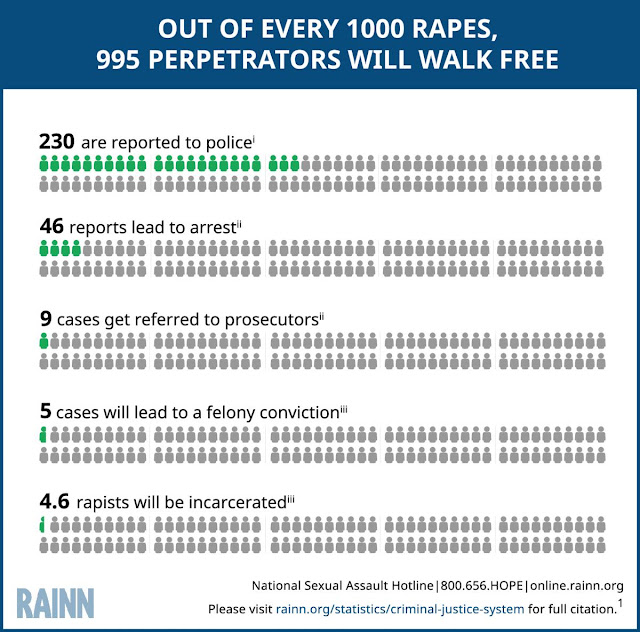Becoming a Rape Advocate – Day 2
This week I attended the
second training day to become a Rape Advocate.
We had two assistant district attorneys from the county come and speak
to us about the difficulties of prosecuting rape and sexual assault cases as
well as the process of trying a perpetrator.
I figured I’d share some of the information I was given.
This information can be
found here.
They got this information
from RAINN, which is the nation’s largest anti-sexual violence
organization. You can check out the
stats and get more information on their website www.rainn.org.
Additionally, they shared
that 36% of rapes are among family or intimates and 42% of rapes are among
friends or acquaintances. So basically,
a victim of rape and sexual assault is more likely to know the person than
not.
So what does all this
mean? Well, it means that perpetrators
of sexual violence are less likely to go to prison than other criminals. And in the majority of sexual assault cases
the victims have named their rapist unlike victims of robbery who rarely know the
identity of the perpetrator. The DA’s
told us that sexual violence crimes are some of the hardest to try and even
more difficult to receive a conviction.
I’m sure you’re asking
why, if victims name the person who assaulted them, is it so hard to convict
more of these people? Well, all you
really have to do is check out social media.
Every day we are treated to stories about victims of rape who didn’t
report immediately and those who do/did report are basically raked over the
coals – accused of bringing it on themselves by virtue of the clothes they are
wearing, their levels of intoxication, etc.
Those who don’t report immediately are accused of lying in order to ruin
a person’s life, to gain money and/or fame, etc. The stories of men false accused are dredged
back up as if this is the majority of what happens in rape cases rather than
the minority. And just to remind
everyone, only 2-8% of sexual assault accusations are false. So which is more likely?
As a survivor, I can tell
you that I was scared, confused, and ashamed.
I didn’t know what to do or say.
I was afraid of what would happen if I said anything. I was afraid I wouldn’t be believed or that
nothing would be done.
From the RAINN
website (based on information gathered from victims from 2005-2010):
- 20% feared retaliation
- 13% believed the police would not do anything to help
- 2% believed the police could not do anything to help
This month is Sexual
Violence Awareness Month. I ask that
people do their research, listen to the stories of survivors with open minds and
open hearts rather than cynicism and judgment.
Please wear teal to bring awareness, volunteer at a women’s shelter, and
do research about sexual violence against women and children.


Comments
Post a Comment